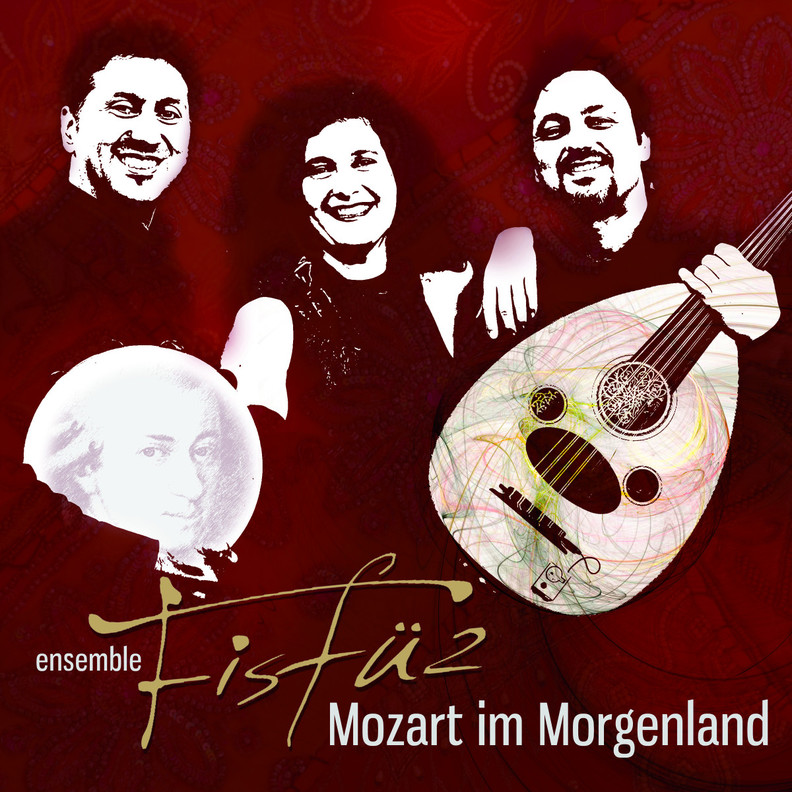Mozart in the Orient (Pianissimo Music 2014)

Annette Maye – Clarinets
Gürkan Balkan – Ud, Guitar, Vocals
Murat Coşkun – Frame Drums, Percussion
The turkish-german trio engenders an occidental-oriental body of sound, a fusion of Mozarts ideas with the turkish musicworld of the court of the sultan.
Mozart in the Orient - The Abducted from the Seraglio
It might have been as follows: In the year 1781 the 25-year-old Mozart receives an order from the Emperor of Austria, very interested in arts, to compose a german Singspiel with an exotic and oriental action. The young composer at this moment stands at a turning point of his life. Inspite of the reluctance of his father, Mozart, after having resigned his employment to earn a living as a freelance artist, travelled to Vienna where he recieved the first big order in this city. The standard text is quickly found: the operetta from C.F. Bretzner „Belmont and Constanze or The Abduction from the Seraglio“, which plays at the distant coast of Turkey. The imperial agent for musical comedy and librettist Johann Gottlieb Stephanie (the younger one) workes on a revised edition of the operetta and Mozart creates the musical part. The Viennese of this time are fascinated by the exotic and oriental World. Therefore the operatic music of Mozart should in a way sound oriental, including exotic scales, fearsome drums and janissary rhythms- but in the same time it has to be familiar to occidental ears!
Time is running out but Mozart, usually full of ideas, is lacking of musical inspiration for the oriental element. A foolish idea takes form: It was common that the great polish music-professor Wojciech Bobowski was abducted to the court of sultan Murad IV, where he had to teach under the name Ali Ufki Bey occidental music including the western way of notation to the Ottoman.
So why not try the same thing vice versa? With the approval and support of the Emperor, the courageous Mozart, accompanied by a cohort, travels thereupon clandestinely to Constantinople to abduct some musicians from the court of the sultan Abdülhamid I. and bring them to Vienna. Off course, the well protected palace could not be entered. Besides they don't want to cause any diplomatic crisis, being aware that the relationship between the two empires yet is tense as a result of the austrian annexation of the formerly ottoman Bukowina.
Thanks to the intermediation and generous remuneration of a guard, Mozart succeeds in recruiting two adventurous musicians, an oud-player und a janissary drummer. He escorts them clandestinely and unnoticed by the sultans entourage out of the city.
Back home in Vienna, Mozart is keen to experience the music of the Orient. Day by day he listens to foreign sounds produced by the heart-warming short-necked lute called Oud and the lively big and small framedrums and bells. He is enthusiastic about the ottoman music, the military music of the janissary and the music played at the sultans court.
But adventurous as he is, Mozart wants more. The clash of cultures shall generate something absolutely unusual and new. Therefore he adds a western instrument: the clarinet, which he got to know during his stay in the court band in Mannheim and since then inserted more and more in his works. So the two seraglian musicians are accompanied by a female prussian clarinetist and now they play as a trio. The three musicians work together on Mozarts musical ideas, growing to arias or becoming own voices advancing the action. The turkish-german trio engenders an occidental-oriental body of sound, a fusion of Mozarts ideas with the turkish musicworld of the court of the sultan.
The rest of the story is quickly told. The first release of the opera „The Abduction from the Seraglio“ the 16th of July 1782 at the national theatre in Vienna will be Mozarts greatest success during his lifetime and it consolidates his achievement as a composer.
It may be mistrusted if „The Abducted from the Seraglio“ really existed. However, the german-turkish musicians trio is very real. Nowadays it is called „ensemble FisFüz“.
Price: 16,-€ (plus 2,50 forwarding expences)
Press comments:
CD review, BZ 03/2014Listen to our music:
-
Track 1 - Ouvertüre
-
Track 2 - Suzidilara
-
Track 3 - Konstanze
-
Track 4 - Der Janitscharen Marsch
-
Track 5 - Durch Zärtlichkeit und Schmeicheln
-
Track 6 - Traurigkei
-
Track 7 - Neva cengi harbi
-
Track 8 - Kalamis
-
Track 9 - Nikriz Pezrevi
-
Track 10 - Vivat Bacchus
-
Track 11 - Romanze
-
Track 12 - Nikriz Longa
-
Track 13 - Nie werd ich deine Huld verkennen
-
Track 14 - Beyoglunda
-
Track 15 - Rondo alla Turca
